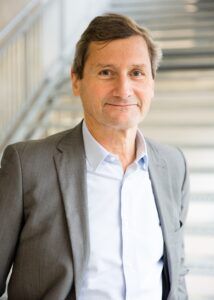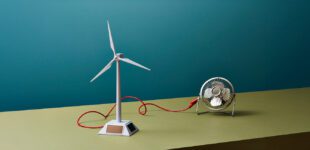January 12, 2022
Climate change and sustainability are among the most pressing problems of our times. IEEE Fellow Bruno Meyer believes that IEEE has a key role to play in addressing these challenges. As the incoming vice-president of IEEE Technical Activities, Meyer has helped coordinate the work of several IEEE associations toward that end. Meyer recently participated in a panel discussion at the United Nations’ Climate Change Conference (COP26) on behalf of IEEE, where he leveraged decades of experience in the energy sector to discuss solutions and strategies in the climate change fight. Entitled “Actions for Clean Energy, Clean Materials and Energy Efficiency to Advance Ambitions and Solutions,” the panel highlighted the important roles that engineers can play in delivering practical solutions to address climate change and adaptation.
 Here, he discusses the role IEEE can play to make a more sustainable world.
Here, he discusses the role IEEE can play to make a more sustainable world.
You recently participated in a panel at COP26. What was your goal there? What message did you want to convey?
The main reason is that IEEE has a significant role to play in the realm of science and technology. Advancing technology for the benefit of humanity is the motto of IEEE, and as members, we are doing important work in the field of climate change mitigation.
Another is that IEEE has a key role in the field of education and STEM. I know from experience, as someone who has worked for over 36 years in industry, that young engineers and scientists when starting their careers are very much attracted by societal or impact issues, such as those related to climate change mitigation. This is something which attracts a lot of young blood and young talent. It should really be on the radar screen for us as an organization with a global presence in this field.
What is IEEE’s role in addressing sustainability efforts?
In 2020, IEEE brought together an ad hoc group of representatives of various groups from across the organization that focused on sustainability efforts. At first it included the IEEE Standards Association, Technical Activities and Member and Geographic Activities, but it grew to include many more, including the IEEE Power and Energy Society, the IEEE Computer Society, IEEE-USA, the Humanitarian Activities Committee and Educational Activities
Many IEEE members, societies and councils already work on various aspects which relate to sustainable development and climate change mitigation. There are a lot of initiatives by IEEE members, and there are many publications supported by IEEE that focus on these issues.
Some of these issues are very technical, and I can give you an example. Information technology consumes many percentage points of the global electricity supply, and it is only growing as digital technology plays an ever increasing role in our daily lives. This is a challenge that IEEE is trying to address.
Talk about climate change often focuses on decarbonization, but there’s also another aspect, and that is one of resilience. How can engineers approach this issue?
On one level, the response to climate change is a global effort. We have the Paris agreement, and there’s a green pact in many countries. The Chinese government also has made steps, all in an effort to diminish greenhouse gas emissions.
But then there comes some challenges that have to do with building a system with resilience.
In the large powerful grids and the power generation stations that generate electricity, more and more electricity will be generated by renewable energy sources, in particular, intermittent renewable energy sources. The main ones are wind energy and solar energy, or solar photovoltaics. They come with some advantages, but also some drawbacks which are related to their intermittency.
For example, the sun doesn’t shine at night, but it’s more intricate than that. If it becomes cloudy suddenly the power from photovoltaic systems can drop very suddenly. So, the system, the power of the grid and the policies need to be resilient to that.
How to make sure that we keep the lights on when power generation is made up of a higher share of renewable energy sources? This is a key global challenge.
What can we expect from IEEE in the future regarding climate change and other initiatives?
IEEE is a great, global organization, with scientists and engineers from so many fields. There are dozens of associations, advisory boards and councils within IEEE, and hundreds of published articles that address the issue of climate change. But across the organization, many do not always know the amazing things that have been done by their scientific neighbors. My vision of the future for IEEE is that we have visibility across the organization for the work IEEE and others are doing to help advance solutions to mitigate climate change.
This is a really a global strategic issue and IEEE has so many strengths to contribute to this opportunity.
IEEE Members and volunteers are working to ensure a sustainable future. To learn more about here.




 Meaningful Momentum or Running in Place?
Meaningful Momentum or Running in Place? AI Through Our Ages
AI Through Our Ages Liquid Infrastructure: Our Planet's Most Precious Resource
Liquid Infrastructure: Our Planet's Most Precious Resource The Impact of Technology in 2025
The Impact of Technology in 2025 Quantum and AI: Safeguards or Threats to Cybersecurity?
Quantum and AI: Safeguards or Threats to Cybersecurity? Why AI Can't Live Without Us
Why AI Can't Live Without Us Bits, Bytes, Buildings and Bridges: Digital-Driven Infrastructure
Bits, Bytes, Buildings and Bridges: Digital-Driven Infrastructure Impact of Technology in 2024
Impact of Technology in 2024 Emerging AI Cybersecurity Challenges and Solutions
Emerging AI Cybersecurity Challenges and Solutions The Skies are Unlimited
The Skies are Unlimited Smart Cities 2030: How Tech is Reshaping Urbanscapes
Smart Cities 2030: How Tech is Reshaping Urbanscapes Impact of Technology 2023
Impact of Technology 2023 Cybersecurity for Life-Changing Innovations
Cybersecurity for Life-Changing Innovations Smarter Wearables Healthier Life
Smarter Wearables Healthier Life Infrastructure In Motion
Infrastructure In Motion The Impact of Tech in 2022 and Beyond
The Impact of Tech in 2022 and Beyond Cybersecurity, Technology and Protecting Our World
Cybersecurity, Technology and Protecting Our World How Technology Helps us Understand Our Health and Wellness
How Technology Helps us Understand Our Health and Wellness The Resilience of Humanity
The Resilience of Humanity Harnessing and Sustaining our Natural Resources
Harnessing and Sustaining our Natural Resources Creating Healthy Spaces Through Technology
Creating Healthy Spaces Through Technology Exceptional Infrastructure Challenges, Technology and Humanity
Exceptional Infrastructure Challenges, Technology and Humanity The Global Impact of IEEE's 802 Standards
The Global Impact of IEEE's 802 Standards Scenes of our Cyber Lives: The Security Threats and Technology Solutions Protecting Us
Scenes of our Cyber Lives: The Security Threats and Technology Solutions Protecting Us How Millennial Parents are Embracing Health and Wellness Technologies for Their Generation Alpha Kids
How Millennial Parents are Embracing Health and Wellness Technologies for Their Generation Alpha Kids Space Exploration, Technology and Our Lives
Space Exploration, Technology and Our Lives Global Innovation and the Environment
Global Innovation and the Environment How Technology, Privacy and Security are Changing Each Other (And Us)
How Technology, Privacy and Security are Changing Each Other (And Us) Find us in booth 31506, LVCC South Hall 3 and experience the Technology Moon Walk
Find us in booth 31506, LVCC South Hall 3 and experience the Technology Moon Walk Virtual and Mixed Reality
Virtual and Mixed Reality How Robots are Improving our Health
How Robots are Improving our Health IEEE Experts and the Robots They are Teaching
IEEE Experts and the Robots They are Teaching See how millennial parents around the world see AI impacting the lives of their tech-infused offspring
See how millennial parents around the world see AI impacting the lives of their tech-infused offspring Take the journey from farm to table and learn how IoT will help us reach the rising demand for food production
Take the journey from farm to table and learn how IoT will help us reach the rising demand for food production Watch technical experts discuss the latest cyber threats
Watch technical experts discuss the latest cyber threats Explore how researchers, teachers, explorers, healthcare and medical professionals use immersive technologies
Explore how researchers, teachers, explorers, healthcare and medical professionals use immersive technologies Follow the timeline to see how Generation AI will be impacted by technology
Follow the timeline to see how Generation AI will be impacted by technology Learn how your IoT data can be used by experiencing a day in a connected life
Learn how your IoT data can be used by experiencing a day in a connected life Listen to technical experts discuss the biggest security threats today
Listen to technical experts discuss the biggest security threats today See how tech has influenced and evolved with the Games
See how tech has influenced and evolved with the Games Enter our virtual home to explore the IoT (Internet of Things) technologies
Enter our virtual home to explore the IoT (Internet of Things) technologies Explore an interactive map showcasing exciting innovations in robotics
Explore an interactive map showcasing exciting innovations in robotics Interactively explore A.I. in recent Hollywood movies
Interactively explore A.I. in recent Hollywood movies Get immersed in technologies that will improve patients' lives
Get immersed in technologies that will improve patients' lives